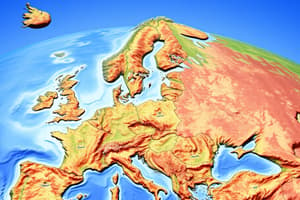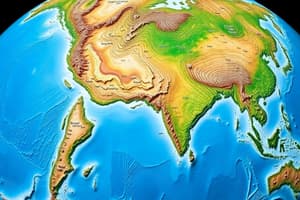Podcast
Questions and Answers
What is the primary focus of Cultural Geographers?
What is the primary focus of Cultural Geographers?
- Social and cultural aspects of geography (correct)
- Economic development
- Political aspects of geography
- Physical Geography
What is a common role for Research Assistants in geography?
What is a common role for Research Assistants in geography?
- Writing sections of research papers
- Managing tourism projects
- Conducting fieldwork and data analysis (correct)
- Teaching university courses
Which skills are essential for geographers according to the text?
Which skills are essential for geographers according to the text?
- Programming languages
- Quantitative and qualitative methods (correct)
- Art history knowledge
- Cooking skills
What is one of the reasons why Geography matters according to the text?
What is one of the reasons why Geography matters according to the text?
In which area can geographers make a difference according to the text?
In which area can geographers make a difference according to the text?
What opportunities does the field of Geography offer according to the text?
What opportunities does the field of Geography offer according to the text?
What is the main focus of Physical Geographers?
What is the main focus of Physical Geographers?
In which settings can geographers work?
In which settings can geographers work?
What do Human Geographers specialize in?
What do Human Geographers specialize in?
Which of the following is a role that Geographers may play?
Which of the following is a role that Geographers may play?
What types of projects do Geographers work on?
What types of projects do Geographers work on?
What is a significant focus area for Environmental Geographers?
What is a significant focus area for Environmental Geographers?
Flashcards are hidden until you start studying
Study Notes
Discovering the Diverse World of Geography
Geography, a discipline that explores the physical and cultural aspects of the Earth, holds a vast and intriguing array of possibilities for individuals interested in understanding our planet and the complex relationships between its spaces and peoples. This article will delve into the various facets of geography, focusing on the roles of research and education within the field, and the skills and knowledge required to become an integral part of this dynamic field.
Geographers at Work
Geographers find themselves working in a variety of settings, from governmental agencies to private research institutions, universities, and beyond. Their expertise is sought after for a diverse range of projects that span physical geography and the study of places and regions, as well as the interactions between human societies and their environments.
Geographers wear many hats. They may function as Physical Geographers, Human Geographers, Economic Geographers, Environmental Geographers, or Regional Geographers, each specializing in particular areas of the field.
Physical Geography and Environment
Physical Geographers study the natural world, exploring the Earth's features, processes, and patterns. They delve into topics like climate, landforms, and ecosystems. The environment is a significant part of their research, and they are often involved in understanding the impacts of natural disasters and environmental change.
Places and Regions
Human Geographers, Cultural Geographers, and Regional Geographers focus on the social, cultural, political, and economic aspects of geography. They investigate the relationships between people and their surroundings, studying topics such as migration, urbanization, tourism, and economic development.
Research Assistants and Academic Careers
Research Assistants play an essential role in geography, contributing to projects and publications while gaining experience in their field. They often work as part of a research team, conducting fieldwork, data collection, and analysis. Research Assistants in an academic setting may assist with data analysis, writing sections of research papers, and grant applications.
Academic careers in geography are diverse, with opportunities for teaching, research, and collaboration. Geographers work as university professors, lecturers, and researchers, and they may also be involved in projects and consultancies, utilizing their skills to solve real-world problems.
Skills and Education
Geographers need a strong educational foundation, typically including courses in Physical Geography, Geographic Information Systems (GIS), Remote Sensing, Environmental Management, Quantitative Methods, Human Geography, Regional Geography, World Geography, Qualitative Methods, Geographic Information Systems, Cultural Geography, and more.
In addition to the required courses, geographers need to be proficient in quantitative and qualitative methods, physical geography, human geography, field methods, geospatial technologies, and regional geography.
Why Geography Matters
Geography is a fundamental discipline that has a profound impact on our understanding of the world. It allows us to explore the relationships between spaces and people, provides insights into environmental processes and change, and fosters an appreciation for the complexity and beauty of our planet.
As a geographer, you will have the opportunity to work on projects that make a difference, whether it's mapping food deserts, understanding the impacts of climate change, or examining the relationships between human societies and their environments. The field of geography is dynamic, exciting, and ever-evolving, offering numerous opportunities for exploration, research, and collaboration.
So, if you're curious about the world around you, passionate about understanding the connections between spaces and people, and eager to explore the complexities of our planet, then geography might be the right field for you.
Studying That Suits You
Use AI to generate personalized quizzes and flashcards to suit your learning preferences.




